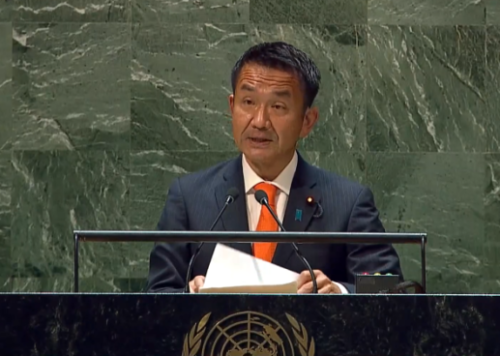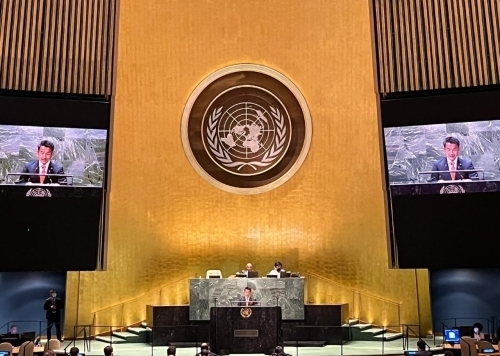国連総会会合「国連システムの強化」における小田原潔外務副大臣ステートメント
令和4年6月8日
 |
 |
(As delivered)
Mr. President,
Thank you for convening this important meeting.
Last weekend, yet again, North Korea launched ballistic missiles, this time multiple launches in a single day, which was the largest number in over a decade.
This took place less than ten days after the Security Council was, to our deep regret, blocked from taking action in response to North Korea’s numerous violations of previous Council resolutions. North Korea continues to accelerate its nuclear and missile programs as if it were taking advantage of the lack of a strong Council reaction. One might wonder if the use of veto against the overwhelming convergence of positions among the Council members may have emboldened North Korea. Needless to say, North Korea’s assertion is totally unacceptable.
Mr. President,
Having heard the explanations from those who cast vetoes, Japan must express, with a heavy heart, its deep regret that the veto was used. Those explanations fall short of the accountability that we hoped to see, especially in light of the following two considerations.
Firstly, by repeatedly launching 60 or more ballistic missiles since 2019 including the multiple launches of this Sunday, North Korea has continued to increase the level of threat to our region and beyond. The silence of the Council, due to the exercise of the veto, has left this grave situation unaddressed.
Secondly, the latest veto has blocked the Security Council from taking action according to its own decision in its previous resolution. Resolution 2397 of 2017 clearly stipulates that the Council will take further measures in the event of an ICBM launch by North Korea. North Korea did launch ICBMs, but the veto has prevented the Council from implementing its own decision. The credibility of the Council is at risk.
The vetoed draft resolution was well-balanced. It was designed to honor the Council’s commitment to take significant measures to restrain the threat which North Korea poses with its nuclear and missile programs. It was also intended to allow for humanitarian measures to account for the needs of people in North Korea.
Mr. President,
Please imagine that a ballistic missile from your neighbor were to impact just 150km off your coastline.
And that their ballistic missiles have at times flown over your territory. This is exactly what has happened to us as a result of North Korea’s missile launches.
North Korea’s nuclear and missile development has a significant impact on global security as well, especially from two aspects.
First, nuclear. Only North Korea has carried out nuclear tests in the 21st century. What is gravely concerning is that North Korea has recently even announced its intention to advance its nuclear forces, I quote, “at the fastest possible speed”, end of quote. It also alluded to the possible use of nuclear weapons, not just for deterrence but for other purposes. This is overtly shaking the basis of international peace and security.
Second, non-proliferation. North Korea has its own track-record of exporting its weapons and technologies to third parties. The lack of strong action by the Security Council only harms the global non-proliferation regime, including the NPT.
These dangerous impacts only reinforce the need for the Council to take strong action by adopting a new resolution in response to North Korea’s ICBM launches and other activities which violate Council resolutions.
Mr. President,
I would like to urge North Korea to engage in diplomacy toward denuclearization and accept the repeated offers of dialogue. It should strive to improve its humanitarian situation, instead of investing in its Weapons of Mass Destruction and missile programs. I also reiterate our most serious call for North Korea to take concrete measures towards the immediate resolution of the abductions issue.
Last but not least, Japan would like to stress that, despite the vetoes cast by some permanent members, all relevant Security Council resolutions remain in effect. I call upon all Member States to continue to fully and effectively implement those resolutions.
I thank you.
Thank you for convening this important meeting.
Last weekend, yet again, North Korea launched ballistic missiles, this time multiple launches in a single day, which was the largest number in over a decade.
This took place less than ten days after the Security Council was, to our deep regret, blocked from taking action in response to North Korea’s numerous violations of previous Council resolutions. North Korea continues to accelerate its nuclear and missile programs as if it were taking advantage of the lack of a strong Council reaction. One might wonder if the use of veto against the overwhelming convergence of positions among the Council members may have emboldened North Korea. Needless to say, North Korea’s assertion is totally unacceptable.
Mr. President,
Having heard the explanations from those who cast vetoes, Japan must express, with a heavy heart, its deep regret that the veto was used. Those explanations fall short of the accountability that we hoped to see, especially in light of the following two considerations.
Firstly, by repeatedly launching 60 or more ballistic missiles since 2019 including the multiple launches of this Sunday, North Korea has continued to increase the level of threat to our region and beyond. The silence of the Council, due to the exercise of the veto, has left this grave situation unaddressed.
Secondly, the latest veto has blocked the Security Council from taking action according to its own decision in its previous resolution. Resolution 2397 of 2017 clearly stipulates that the Council will take further measures in the event of an ICBM launch by North Korea. North Korea did launch ICBMs, but the veto has prevented the Council from implementing its own decision. The credibility of the Council is at risk.
The vetoed draft resolution was well-balanced. It was designed to honor the Council’s commitment to take significant measures to restrain the threat which North Korea poses with its nuclear and missile programs. It was also intended to allow for humanitarian measures to account for the needs of people in North Korea.
Mr. President,
Please imagine that a ballistic missile from your neighbor were to impact just 150km off your coastline.
And that their ballistic missiles have at times flown over your territory. This is exactly what has happened to us as a result of North Korea’s missile launches.
North Korea’s nuclear and missile development has a significant impact on global security as well, especially from two aspects.
First, nuclear. Only North Korea has carried out nuclear tests in the 21st century. What is gravely concerning is that North Korea has recently even announced its intention to advance its nuclear forces, I quote, “at the fastest possible speed”, end of quote. It also alluded to the possible use of nuclear weapons, not just for deterrence but for other purposes. This is overtly shaking the basis of international peace and security.
Second, non-proliferation. North Korea has its own track-record of exporting its weapons and technologies to third parties. The lack of strong action by the Security Council only harms the global non-proliferation regime, including the NPT.
These dangerous impacts only reinforce the need for the Council to take strong action by adopting a new resolution in response to North Korea’s ICBM launches and other activities which violate Council resolutions.
Mr. President,
I would like to urge North Korea to engage in diplomacy toward denuclearization and accept the repeated offers of dialogue. It should strive to improve its humanitarian situation, instead of investing in its Weapons of Mass Destruction and missile programs. I also reiterate our most serious call for North Korea to take concrete measures towards the immediate resolution of the abductions issue.
Last but not least, Japan would like to stress that, despite the vetoes cast by some permanent members, all relevant Security Council resolutions remain in effect. I call upon all Member States to continue to fully and effectively implement those resolutions.
I thank you.
